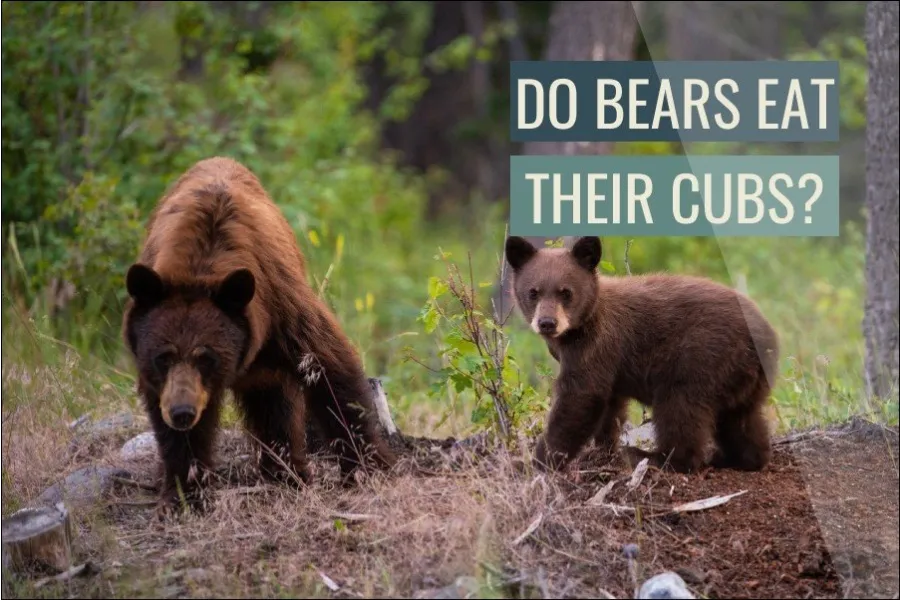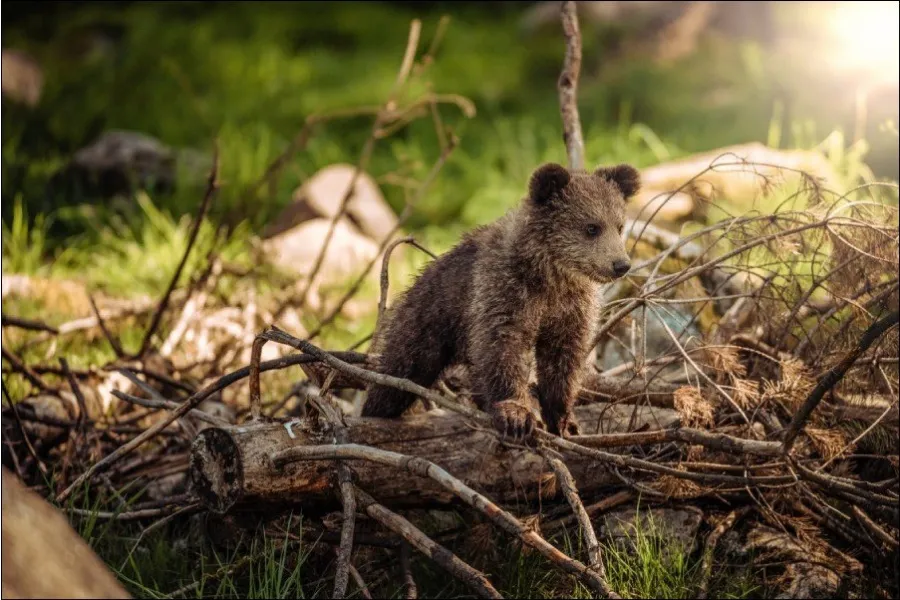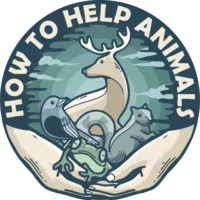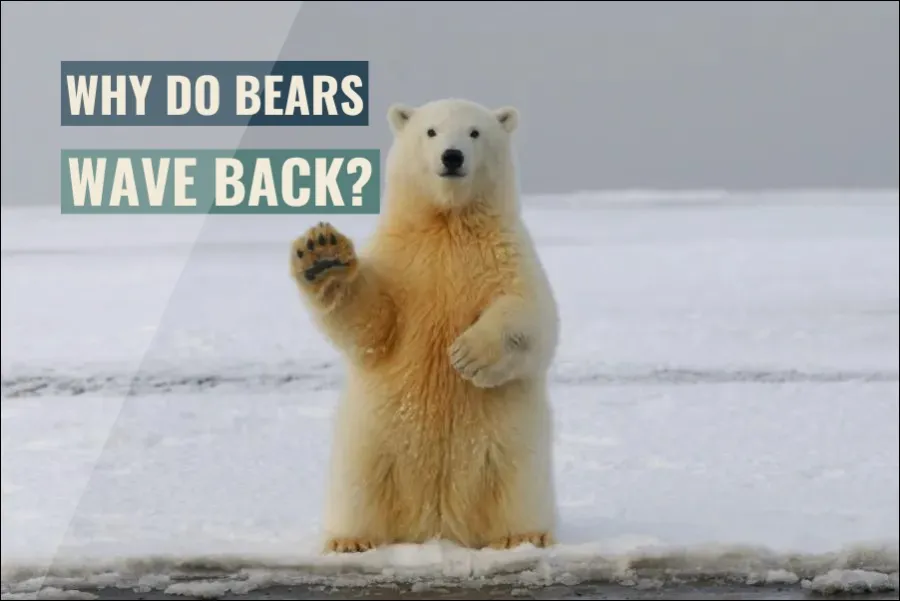
Bears come in almost any color, shape, and form. And so does their young ones. Bear cubs are born between mid-January and early February during hibernation, but not all of them survive. Almost half of a litter dies in their first year. A female can produce up to 5 cubs in a litter, but 2-3 cubs on average.
Bears sometimes kill and eat their own cubs. It’s common in the animal kingdom for males to impregnate as many females as possible. Females can’t become pregnant when they are nursing. Therefore, the male bears sometimes kill the cubs in order for the female to stop lactating.
In scarce times, there’s also a risk the mother will kill one of their cubs in order to provide food for the rest of the family. However, this is less common than males killing cubs in order to mate and spread their DNA.
Do bears kill their own cubs?
Almost half of all bear cubs die during their first year. An adult male bear knows which females he has mated with and tries to kill the cubs he isn’t a parent to. If the young die, the female bear will be in heat within a few days, and then the male will have a chance to mate and spread his own genes.
In order to protect their cubs, mothers tend to mate with multiple males in the area. If one of the males is killed during hunting, new ones will take their place and the risk of the cubs getting killed increases. During regulated hunting, male bears are primarily targeted in order to help the mother.
It has also been shown mothers protect their cubs in another way. When the mothers notice male bears want to harm their cubs, she takes them to the city for refuge. It was earlier believed the mother took her cubs to the city in search of food, but according to a study from the Norwegian University of Life Sciences and the University College of Southeast Norway, it was proved she was looking for protection.
When food is scarce, there’s a risk of the mother killing one of her cubs in order to feed the rest of the family.
Most common reasons bears are dying
The most common reasons the bears die are human-related. The most common is hunting, and the second is traffic accidents. Other reasons the bears die that aren’t human-related are starvation, spring avalanches, natural disasters, illness, injuries, and predation. They can also die from wounds caused by other bears during fights.
| Bear | Lifespan (in the wild) |
|---|---|
| Asiatic Black Bear | 25-30 years |
| Grizzly bear | 20-25 years |
| Black bear | 18-23 years |
| Brown bear | 20-30 years |
| Polar bear | 25-30 years |
| Spectacled Bear | 20 years |
| Giant Panda | 20 years |
| Malayan Sun Bear | 20 years |
| Kodiak bears | 20-25 years |

Do bears cannibalize?
Bears of North America, including black bears, coastal brown bears, grizzly bears, Kodiak bears, and polar bears, all practice infanticide and cannibalism to varying degrees.
There are different reasons bears eat each other, including bears within the same species. Grizzly bears track, hunt, kill and eat black bears. When the food supply is scarce, for example, when salmon runs poor or late, both female and male bears can eat bears in their own species, including the cubs, if they are desperate enough.
In some cases, it has been shown bears kill cubs and other young bears for no other apparent reason. Some scientists say bears (including females and males) kill younger and less dominant bears in order to reduce their current and future competition. Reducing the competition will help them to secure their food territory and breeding rights.
-
Why Do Bears Wave Back At You? (Answered)

Have you ever waved at a bear and received a wave back in return? If so, you may be surprised to learn that bears do not wave in the same
What is the biggest threat to bear cubs?
Bear cubs have a variety of threats to them. Despite the risk of being killed by adult male bears, some things are a more significant threat to them.
Habitat loss
Ever since humanity has increased its habitat, the animals have lost theirs. With less area to live on, the competition between species is greater, and everything becomes more difficult.
Drought
In drought periods, the lack of water can force bears to dehydrate. There are many reasons why drought can occur. However, scientists frequently mention the effects of global warming and climate change to be vital factors of drought and other natural disasters.
Starvation
When the food supply is scarce, the bear cubs risk starving or becoming someone else’s dinner. Adult bears who starve sometimes eat their younglings in order to survive. This goes hand in hand with habitat loss. With less land to find food and the food supply decreases, the competition for food increases.
Fires
Forest fires are one of the biggest threats to bear cubs. Forest fires have become more common lately, and much evidence points towards climate change. However, 85% of all forest fires are caused by humans. Mainly due to unattended campfires, burning debris, negligently discarded cigarettes, and of course, arson.
Can bears eat humans?
It has happened that bears have eaten humans before. Although these occasions are extremely rare, and most attacks towards humans are self-defense and not predatory. Bears avoid humans and prefer to be left alone. That’s why hikers sometimes hang a bell from their backpacks in order to make a noise the bear could hear from far away and move away in time.
Bears attacking humans in order to feed is the rarest form of bear attacks. Depending on the season, a bear’s diet consists of roots, berries, meat, fish, insects, larvae, grass, and other succulents. Their favorite foods are food that grows on shrubs. However, it’s not uncommon to find a bear devouring a rotting animal carcass.
Bears rarely attack humans, even more uncommon are they attacking humans in order to feed. However, it has happened and can’t be ruled out.

